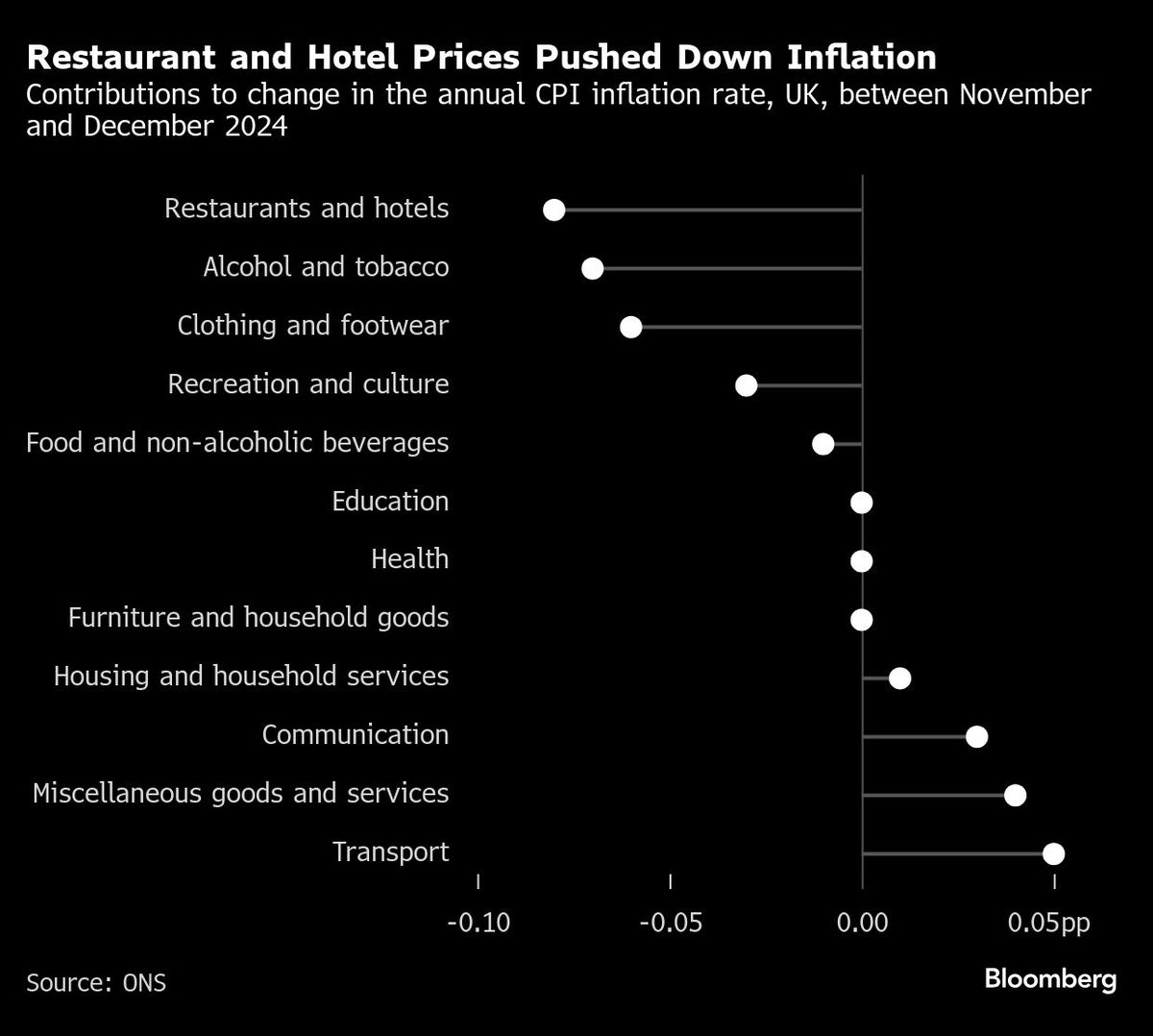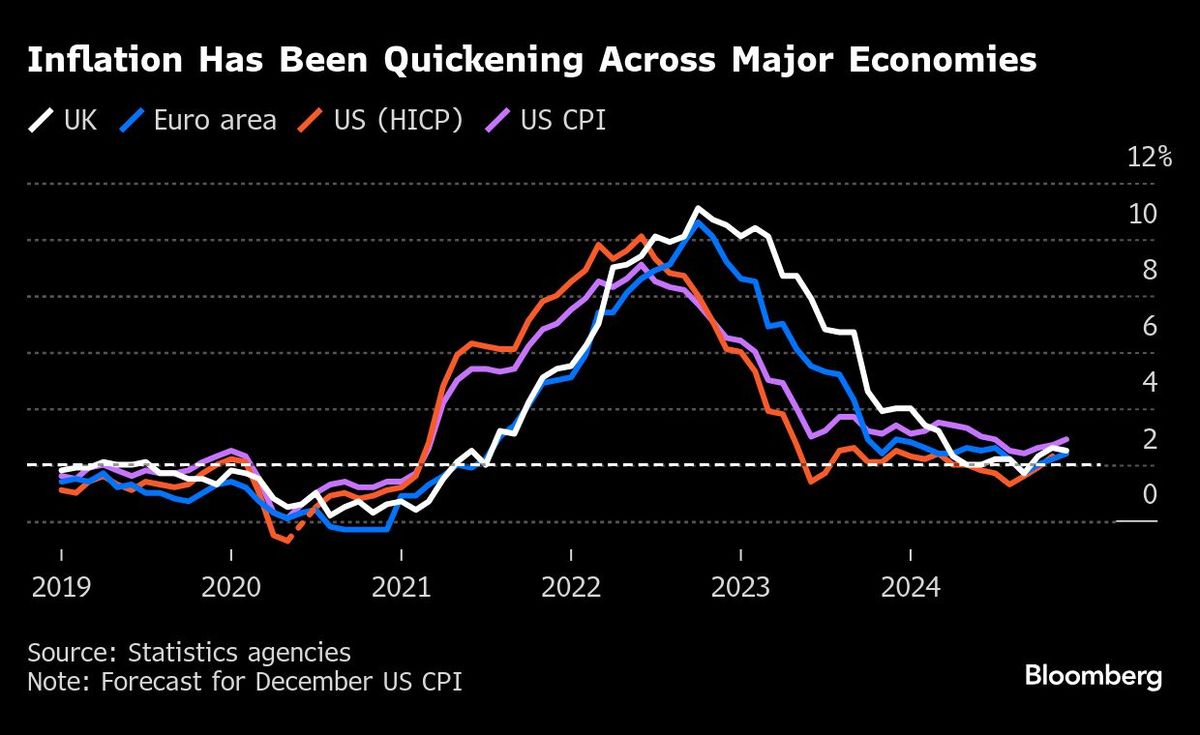
(Jan 15): UK inflation unexpectedly cooled for the first time in three months in December, prompting traders to increase bets on Bank of England (BOE) interest-rate cuts this year and soothing market jitters surrounding the British economy.
Consumer prices rose 2.5% from a year earlier, down from a 2.6% pace in November, the Office for National Statistics (ONS) said on Wednesday. The figure was in line with the BOE’s forecast from November and better than the unchanged reading expected by private-sector economists.
There were signs that underlying pressures are abating as price growth in the services sector eased to 4.4%, the lowest since March 2022, from 5%. However, the fall was largely driven by a plunge in volatile air fares and a sharp easing in hotel price inflation. Economists warned these factors may reverse.
Still, the bigger-than-predicted cooling in price pressures calmed investors after a week of turmoil on financial markets that pushed benchmark government bond yields to a 17-year high and threatened to derail Chancellor of the Exchequer Rachel Reeves’ entire economic agenda. Higher borrowing costs have put her at risk of breaking her own fiscal rules ahead of a crucial update from the Office for Budget Responsibility on March 26.
The 10-year gilt yield pulled back eight basis points on Wednesday morning to around 4.8%, a larger drop than seen in European bonds and earning Reeves a little more breathing space. The pound slipped as much as 0.4% after the release but then rose to US$1.224, up slightly on the day.
Reeves did not mention the recent market sell-off in her response to the inflation data, but said there was “still work to be done” to contain inflation.
Traders added to rate cut bets following the figures, pricing in an extra 12 basis points of easing by the end of the year. That means they now largely expect two quarter-point cuts in 2025. Governor Andrew Bailey and fellow rate-setters have signalled they back further reductions at a “gradual” pace.
Energy bills
Economists have warned that inflation could climb back this year at above 3%, driven partly by higher energy and fuel costs. That would be higher than the 2.8% peak the BOE had expected back in November. Bloomberg cross-asset strategist Ven Ram had warned that any drop in inflation may only bring short-term relief for gilts. Traders were still “concerned that the worst is yet to come for cost pressures”.
Erratic factors may have also played a part in the large drop in services inflation that eased investor worries. It was partly driven by by a 26% year-on-year plunge in air fares, a volatile component. Month-on-month, the usual increase in air fares for the holidays in December was the smallest in five years.
Capital Economics deputy chief UK economist Ruth Gregory pointed out that half of the 0.6-percentage-point fall in services inflation was due to air fares, which are volatile. “While the softening is not as marked as it appears at first sight, underlying price pressures still appear a bit more favourable than we had thought,” she said.
There remains the risk that Reeves is presiding over an economy at risk of stagflation — a combination of high prices and anemic growth. Figures on Thursday are forecast to show the economy grew just 0.2% in November, putting Britain on track for a second quarter of stagnation.
The figures were the final look at prices before the BOE decides on Feb 6 whether it can reduce interest rates for only the third time since it starting cutting in August.
Traders are now awaiting crucial inflation data later on Wednesday in the US, where bonds have also been under pressure, for clues about how quickly the US Federal Reserve will cut interest rates.
The BOE is contending with threats on a number of fronts, including rising global trade tensions with the Donald Trump about to enter the White House, the fallout from Labour’s first budget, and the turmoil that has engulfed UK markets in recent weeks. While the sharp rise in bond yields in 2025 may dampen UK growth by tightening financial conditions, economists warn that uncertainty over inflation may keep officials hesitant over rushing into cuts.
“Inflation eased very slightly as hotel prices dipped this month, but rose a year ago. The cost of tobacco was another downward driver, as prices increased by less than this time last year,” said ONS chief economist Grant Fitzner.
Core CPI inflation, which excludes energy, food, alcohol and tobacco, fell to 3.2% from 3.5%, undershooting economists’ forecasts.
Pipeline cost pressures remain subdued, with producer fuel and raw material prices down 1.5% from a year earlier and the cost of goods leaving factory gates rising just 0.1%.
Uploaded by Tham Yek Lee
- Malaysian Highway Authority: 20km traffic jam on KL-Karak Highway as Raya travellers return
- China’s rare earths curbs put multiple US industries at risk
- US starts collecting Trump's new 10% tariff, smashing global trade norms
- China to US: 'Market has spoken' after tariffs spur selloff
- FMM flags significant challenge for 200 businesses amid 20-day gas disruption after Putra Heights fire
- Panasonic donates RM120,000 in e-vouchers to support Putra Heights victims
- Opec+ panel stresses compliance after surprise oil output hike
- Putra Heights fire: Airbnb offers 78 temporary homes for victims — Amirudin
- Indonesia's central bank vows to support rupiah amid trade tariffs threat
- Putra Heights fire: 42 victims still warded — MOH


